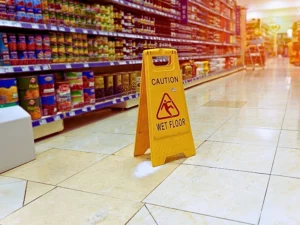Depending on the cause, multiple parties could be liable for elevator accidents, including property owners, maintenance professionals, or passengers. To determine who is liable for elevator accidents, we must consider the types of accidents and the laws in place in Nevada to maintain elevator safety.
For help with an elevator accident claim or lawsuit, reach out to the experienced Las Vegas elevator accident attorneys at George Bochanis Injury Law Offices, Call 702-388-2005 for a free consultation.
Nevada Laws and Regulations Regarding Elevator Safety
Cities like Las Vegas are more likely than other areas to experience elevator accidents because of the number of high-rises in these locations and their heavy populations. But, how many people die in elevator accidents or sustain injuries? One recent study found that the country sees about 17,000 injuries and 30 fatalities every year due to elevator malfunctions and other related accidents.
Because of the nature of their use and the accidents involved, escalator and elevator accidents often result in severe injuries, which is why it’s crucial for property owners to keep this equipment consistently safe.
To make elevators safer for passengers in all types of buildings, Nevada has laws and regulations regarding the construction and maintenance of elevators, along with safety and security features.
These requirements include:
Elevator Permits
To operate an elevator, property owners must obtain a permit from Nevada’s governing authority, the Mechanical Compliance Section (MCS). Property owners must also acquire permits from the MCS for other fixtures, including pressure vessels and boilers.
Elevator Inspections
All inspections must comply with the standards and codes that various MCS-adopted agencies have established, including the American Society of Mechanical Engineers (ASME) and the National Fire Protection Association (NFPA). A licensed service company must also complete these inspections.
Elevator Shaft Enclosures
Under Nevada law and MCS regulations, elevator shafts must also not share enclosures with stairways. One exception is if the stairway and elevator are in an open parking garage.
Elevator Accident Reporting
In the event of an elevator accident, property owners or their agents need to report the accident to the MCS, which will then investigate the accident and inspect the elevator to develop a complete accident report.
Newer Door Requirements
More recently, Nevada laws and regulations have put restrictions in place for elevator doors. Specifically, elevators now require door locks to keep the elevator in place if the door safety circuit experiences a malfunction or becomes disabled. Additionally, elevator doors need restrictors to keep doors from opening outside designated landing zones, which reduces the risk of falls, snagging, and other door-related accidents.
Responsibilities of Property Owners
Property owners may be liable for accidents resulting from improperly maintained or operated elevators in many cases. These parties must do what they can to keep elevators safe, but some of the most common hotel injuries result from a lack of oversight from property owners.
The following are the primary responsibilities property owners have when it comes to maintaining elevator safety:
Maintaining Compliance
Property owners must take steps to keep all elevators compliant with local and national safety standards and building codes under the MCS and other related organizations.
Routine and Preventative Maintenance
Property owners are also responsible for ensuring elevators undergo regular maintenance as needed to identify and address potential issues impacting operation. Qualified professionals must perform these maintenance checks, which will entail steps like:
- Lubricating various moving components
- Maintaining balanced oil levels
- Repairing or replacing damaged or worn parts
Displaying Proper Signage
In addition, property owners need to put up adequate signage in the elevator indicating passenger capacity and weight limits, along with certificates of inspection.
Training Requirements
Hotels and other facilities must train staff on proper elevator operation to further maintain safety.
Surveillance
Elevators must also frequently have surveillance cameras installed inside, or in surrounding hallways or other areas that may require added visibility.
Access Control
To restrict elevator access to unauthorized individuals or to prevent overloading, property owners are liable for maintaining effective access control using biometric systems or other measures.
If property owners fall short in these measures in any way, hotel escalator and elevator accident risk can increase.
Who Is Liable for Elevator Accidents?
Although property owners are often responsible for elevator accidents and injuries, this isn’t always the case. Accidents can also occur when various other parties exhibit negligence or malicious intent, including:
Maintenance Personnel
While property owners are responsible for scheduling regular maintenance, the professional hired to do the job could wind up overlooking or failing to properly address issues. For instance, while inspecting the elevator, a maintenance professional may not notice a worn part that should’ve been visible to the individual and was subject to routine maintenance. In these instances, maintenance professionals or companies might be liable for accidents and injuries.
Elevator Manufacturers
Elevator manufacturing companies may also be liable if they fail to design or manufacture safe elevators or components. Manufacturers must also provide proper labels, warnings, and instructions for proper use to minimize the risk of injury. Even if the elevator or part is outside its warranty, manufacturers may be responsible if an accident occurs because of its negligence.
Passengers or Other Individuals
Sometimes, passengers and other people could be responsible for elevator-related accidents. For instance, passengers may acknowledge, but choose to ignore, signage indicating passenger limits, entering the elevator and causing overloading and a subsequent accident. Hotel guests could also be responsible for accidents through negligence or maliciousness, such as getting into altercations on elevators that result in tripping or other types of accidents and injuries. In some cases, assaults and other criminal activity could make individuals criminally liable.
Types of Elevator Accidents
There are multiple types of elevator accidents that can occur through negligence or other causes. The following are some of the most common accident types:
Falls
Elevators could fall in extreme cases due to malfunctions or other issues such as exceeded weight capacity. Other falls could result when passengers fall out of the elevator, such as if an elevator door opens at the wrong time and passengers attempt to leave.
Trip and Falls
Elevator floors must line up with the floors of their corresponding stops. If the elevator floor is too high or too low, even by a fraction of an inch, passengers could trip and fall, which could cause serious injuries in some cases.
Snagging
Elevators and floors must also maintain a close distance to minimize the risk of clothes or other items snagging between them. Otherwise, snagging could trap items and people in the elevator door, which could lead to trip and falls or more serious accidents.
Crushing
People could suffer crushing injuries if they become stuck between elevator doors and floors, especially if door sensors fail and the elevator continues moving despite an open door.
Steps to Take After an Elevator Accident
Following an elevator accident, there are steps to take to help you recover medically and determine who to sue before seeking compensation.
The following are the actions you’ll need to take after an accident to help you succeed with a case:
Seek Medical Care
Regardless of the severity of your injuries, you should seek medical attention from a qualified doctor as soon as possible. A medical professional can identify and address injuries and help prevent them from developing into serious conditions in the future. The sooner you seek medical care, the easier it will be to prove that the elevator accident caused your injuries.
Report Your Accident to Staff and Authorities
Another crucial step immediately after an accident is to report the accident to building staff or management and report the accident to local authorities. Police may arrive at the scene and draft an accident report, which could help determine liability and support a claim or lawsuit.
Gather Evidence to Build a Case
The next step will entail collecting sufficient evidence to support your claim or suit. There are many pieces of evidence that could factor into your case, such as:
- Medical records, bills, and receipts
- Proof of lost income and lost earning potential
- Police reports
- Witness statements
- Surveillance footage, including CCTV cameras inside the elevator
- Maintenance reports and records
Speak With a Lawyer
You’ll also need to consult with an attorney before moving forward with a case. A reliable elevator accident lawyer in Las Vegas can discuss a claim or lawsuit in a free consultation. During this process, the attorney will determine whether he or she can help you seek compensation. If the lawyer decides to represent you, he or she will be able to perform vital tasks related to your case to maximize your chances of success.
When to Hire an Elevator Accident Attorney
In the event of an injurious elevator accident that resulted from a form of negligence or malicious acts, it’s in your best interest to consult with a personal injury lawyer to discuss compensation.
The following are the ways an attorney can help following an elevator accident:
Determining Liability
One way a lawyer can help is by pinpointing who to sue for elevator accidents. As mentioned, many parties could be responsible, from property owners and maintenance companies to passengers and manufacturers. In some cases, depending on the circumstances leading up to and culminating in the accident, multiple parties may be liable.
Quantifying Compensation
Based on all the damages resulting from the accident, your attorney could also help calculate all the economic and non-economic damages involved. While economic damages refer to financial losses sustained, such as medical bills and lost income, non-economic damages account for the pain and suffering and other personal damages resulting from the accident.
In rare instances, attorneys could also determine that a liable party exhibited gross negligence or malicious intent, warranting punitive damages on top of compensatory damages. However, you will only be able to recover these damages if your case goes to court in front of a judge and jury.
Collecting Evidence
Many pieces of evidence will factor into a case to prove liability and the nature of your injuries. It can be difficult to obtain some of this evidence, but an attorney could help in various ways. For example, a lawyer could get in touch with medical professionals to obtain detailed medical records or police departments to obtain police reports and witness statements.
In some cases, attorneys could also hire expert witnesses to recreate the accident and further prove how one or more parties caused it and your injuries.
Negotiating a Settlement
Hotels and other companies have insurance companies that will handle most cases on their behalf. If you sustain injuries in an elevator-related accident, you may wind up filing a claim against the liable party’s insurer, which can be challenging to succeed with on your own.
Insurers will work hard to avoid large payouts, with adjusters often attempting to greatly reduce or deny claims, often by trying to find claimants partly or entirely liable for accidents.
Attorneys will be aware of these tactics and attempt to fight for a fair settlement, increasing your chances of succeeding with your case. If the case doesn’t settle during initial negotiations, your lawyer may also decide to proceed with a court case and initiate a lawsuit that goes to trial.
During the claims and legal process, your lawyer will walk you through it while you can focus on making a full recovery and spending time with loved ones.Whether property owners, maintenance companies, passengers, or others are liable for an elevator accident, it’s important to connect with a reputable attorney to discuss a case. At George Bochanis Injury Law Offices, our attorneys have experience handling elevator accident cases and many other personal injury claims. Contact us today to schedule a free consultation.





